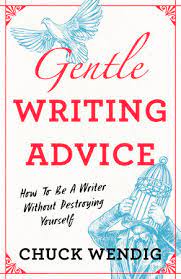Chuck Wendig’s Gentle Writing Advice
Summertime is when I often find new craft inspiration. I have access to brick-and-mortar bookstores that have craft books in English. I can linger, browse, and think about the space I have in my suitcase. Despite trying to limit how many books I bring back with me each time I return from the U.S., so far that type of limit (self-control) has eluded me. I’ve resigned myself to the fact that if it fits in my suitcase without destroying the zippers and without pushing me over the weight limit, it’s coming back with me (travel tip: get a digital scale and pack at least one pound less than your limit because the scales at the airport inevitably weigh slightly heavier). One of the books I brought back with me in my literal book haul this summer is Chuck Wendig’s Gentle Writing Advice: How to Be a Writer Without Destroying Yourself. Published by Writer’s Digest Books, it just came out this year. In my experience, Writer’s Digest Books has a real plethora of useful craft books, and it was fun to find a brand-new selection. I have yet to be disappointed by anything I’ve picked up from their list.
Wendig’s book sits squarely in the category of feel-good, inspirational book, much like How to Write a Novel in 20 Pies, which I wrote about back in January of this year. I have to admit, the subtitle is what pulled me in, that and the bird cage on the cover. Avoiding self-destruction is always appealing, isn’t it?
Key Takeaways
Some of the key takeaways for me in Wendig’s book are:
- You don’t have to write every day, and don’t worry about it if you don’t
- Have a creative fallback which has nothing to do with writing
- Have more fun with your writing (and give yourself permission to do so)
- The pandemic experience might have doused your fire…or ignited it
Thoughts on Writing Every Day (Or Not)
I have some thoughts on writing every day (or not). At some point last year, I think in September, I decided that was it, I was absolutely going to write every single day. And I’ve stuck with it all of these days. I even eked out a few words when I had surgery earlier this year. Is this good? Bad? Lately I really feel a big shoulder shrug about it. The reason is: what happens on that one day when I absolutely can’t write? Am I done forever? Do I sink into a funk that I can’t get out of? As someone who, as of this writing, has an 1100-day streak on Duolingo (after losing my streak of 400+ days), I know how important it is to have these streaks. I know. But does it really matter if you have that streak? Should you ignore friends and family just so you can go and (insert activity here)? My feeling is a wishy-washy yes and no.
As someone who spends her summers decamped at a second home base, I understand what it’s like to want to be on vacation all day, every day. But I also understand that being on vacation all the time isn’t actually that much fun, and, what’s more, it can actually create stress. I’ve gotten pretty good at finding a balance between devoting time to loved ones and devoting time to activities I love doing. Both are important to me. Too much one way or the other will sink me, in more ways than one. That streak, though? Maybe it’s not really necessary to hold yourself quite so accountable for every single thing. There’s something freeing about letting all that recordkeeping go by the wayside…after you get your habit established. If you need an easy way to keep track of what you’re writing, an easy way to get that habit established, all while getting statistics like how many words you write each day, on average, you can set up goals and track your words at the NaNoWriMo website. Just don’t have your whole world revolved around that streak.
A Creative Fallback
Wendig talks about making sure you have a creative fallback that isn’t writing-adjacent. He points out that this means reading doesn’t count. Oh. Reading is my number one hobby and stress relief activity. As I survey the wreckage of my hobby life, I realize I don’t have much left in this department. Trying to stay in shape, pushing back that ever-insistent tide of time, well, that takes a certain amount of time. Apparently more than I can spare, judging from my current lack of muscle tone, but that’s another story.
But what other hobbies do I have? I used to like cooking a lot but now can barely be bothered to chop a vegetable to throw it into the steamer. Maybe I should follow Amy Wallen’s advice and bake a pie but it’s been so hot this summer there’s no way I’m turning on an oven. I could probably stick a pie out on the balcony somewhere and get it to fry. A balcony fry pie. Yum. Learning Polish? That feels more like some kind of weird torture most of the time, although it has its occasional wins. Playing music? I’d love to learn how to play the guitar (or ukelele, given our space constraints around here), but I don’t see that happening any time soon. Does listening to music count? I’m going to be gentle with myself, as Chuck Wendig suggests, and say yes. More on what I’ve been listening to below.
Have More Fun with Your Writing!
This seems like an obvious thing. After all, who would disagree with someone who says to have more fun with your writing? However, depending on your personality, having fun while you’re writing might not be that easy. We worry about writing streaks, achieving goals, being productive; and we listen to our inner critics laughing at what we type or write as we do it. So it’s reassuring to give ourselves permission to just go with it, do whatever we feel, with no judgment on yourself or what you’re writing. This includes doodling, brainstorming, writing text in some form that we don’t normally use (like a poem or a list or a letter or any number of other things). Sometimes it isn’t that easy to give ourselves permission to just have fun but it’s a relief when we can. I’m going to try to remember this, which is actually half the battle for me.

The Pandemic Experience
The pandemic experience was different for everyone and my pandemic experience was decidedly different from Wendig’s. Where Wendig didn’t write for a whole year, I actually began my creative writing pursuits during the height of the pandemic lockdown. I found and signed up for my first creative writing course that year, then followed that with another one, and another one. Kicking around story ideas got added into the mix, in addition to the journaling I had already been doing for years. Granted, I have never in my life written 2,000 words a day even two days in a row (well, okay, maybe it’s happened two days in a row at some point), let alone as my typical routine (the routine Wendig describes as normal for him pre-pandemic), so his going from that to zero writing for a whole year is especially dramatic. I think it just shows that everything that happened and that continues to happen as a result of the pandemic has had differing effects on each of us. If we’re lucky, we’ve been able to find some sort of positive out of the whole nightmare.
Not the Right Choice for These Two Groups
While I can enthusiastically recommend this book, it is not the right choice for these two groups of people: (1) those whose sensibility is easily offended by profuse profanity and (2) those whose sensibility is easily offended by excessive footnoting. Wendig is known for the profanity, I guess you could say. He even refers to it on the first page of his book, giving it as a warning before you proceed. Wendig also talks about how Margaret Atwood recommends his blog, Terribleminds but does give a caveat about all the swear words. And the footnotes. My God, the footnotes. It got to be too much for me after a while, but maybe it won’t bother you.
As Much Megadeth As Possible
As I said in my newsletter, at some point this summer I decided I needed to listen to as much Megadeth as possible. Why, you ask? Because I realized how much I love Dave Mustaine’s lyrics. I can’t listen to anything loud and forceful while I’m writing, though, tending more towards what some would consider to be the pablum of music. A few years ago I listened to this interview with Elif Shafak (skip to the end, around 11:10, if you want to hear just the part about what she listens to when she writes), author of the sad but excellent 10 Minutes 38 Seconds in this Strange World, who said she likes to listen to really loud metal, the louder the better, while she works. More power to her but I can’t focus.
Winger and Elegant Weapons
Aside from Megadeth, I have been enjoying a lot more metal recently (see Wendig’s advice to do things that aren’t writing-related, above) and a couple of bands other than Megadeth have factored into that mix. One that has been in constant loop on my laptop is the new Winger. They are one of my all-time favorite bands, and they have an excellent CD which just came out this summer, Seven. The second group that has been getting a lot of listening time is Elegant Weapons. They are being called a “supergroup” because of the star power of the members making up this project, including Richie Faulkner (Judas Priest); Ronnie Romero (Rainbow, Vandenberg, Michael Schenker); Dave Rimmer (Uriah Heep); and Christopher Williams (Accept). If you have to ask who any of those groups are, then you can probably skip to the next section.😊
Faulkner says, “elegant weapons” are the tools musicians use to create their music. In the band bio he says that “…the craftsman needs the right tools for the job. For a musician, those tools are things like their instruments, their voices….” Using these elegant weapons to make music results in emotions being brought to the surface. Emotions are what we’re after when it comes down to it, right? Cool choice of band name.
Grab Your Elegant Weapons
What are your elegant weapons, writers? A fancy pen and paper? A laptop? Loud industrial metal while you work? Whatever you choose, grab your elegant weapons but remember to be gentle with yourself.
Pulling at Threads is my occasional newsletter. It always accompanies my blog posts but I sometimes send infrequent updates on other goings on. If you want more of an “insider’s” view on what’s happening in my reading and writing life, you can sign up here.


